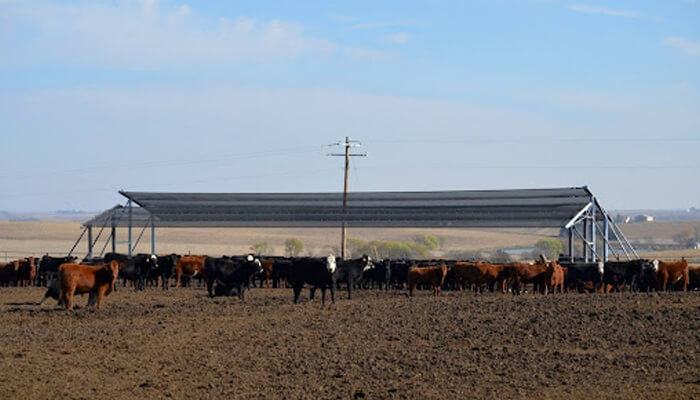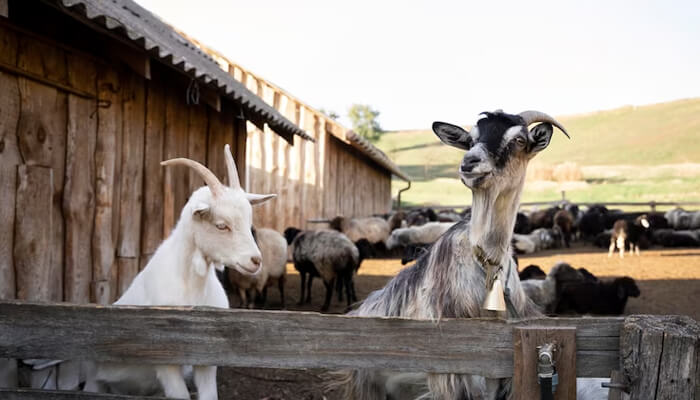When wind blows it transports dust, causes erosions, and carries dangerous forms of pollutants. Wind also damages buildings and stops plants from growing. Most importantly, wind in the form of storms can become problematic for animals.
In this article, we will discuss the importance of protecting your animals using wind shelters and will particularly cover the WeatherSolve Structures and wind shelters.
How Important Is It To Have Wind Shelters For Animals?
Weather conditions in North America, especially Canada, can get severe in winter. It is essential to provide farm animals such as horses and livestock a safe haven where they can seek shelter from wind and cold.
Cold and wind chill can decrease the body temperature to critical levels, resulting in a reduced milk yield and weight gain. Proper wind shelters can reduce production losses and improve the welfare of all animals. Animals without a wind shelter put little energy into production and more energy into ensuring their body functions normally.
Since the livestock produces multiple offspring, farmers need to provide them with the necessary protection from dangerous weather conditions. Newborn lambs and calves are the most vulnerable and are at risk of developing hyperthermia.
The shelter will also enable pregnant livestock to have a chance to relax and destress without being stuck outdoors. Lastly, it will enable you to easily access the equipment, as little lambs and calves will need regular checkups during the wind storm.
The Weather Solve Structures And Wind Shelter
The general purpose of a wind shelter is to provide a windbreak by deflecting the wind away. The best windbreaks can offer a zone behind the windbreak, which will have wind about a quarter of the speed.
For a 15.24 meter (50 feet) high windbreak, the zone will extend to approximately 76 meters (250 feet) downwind. From 76 meters to 152 meters (250 to 500 feet), the wind speed will rise to about half of the incoming wind. Beyond these wind speeds, the speed will increase rapidly.
Wind
The earth is equivalent to the riverbed, while the wind is like a river. Water tumbles and flows over the riverbed. The faster the speed of the flow, the more turbulence (tumbling). For instance, if you throw a large-sized rock into the river, a sheltered spot will appear instantly behind the rock.
This is the most basic form of a windbreak, but the issue is that past the rock, the water that had been deflected around and over the rock would come crashing down.
Products
Here are some wind shelter products from WeatherSolve Structures:
Walkway Screen
This screen system is customizable, and the company can adapt to all types of requirements. One set of posts, there is a visual screen, security fence, and wind protection. The posts are around 20 meters (66 feet) apart and offer various benefits:
- Low visual impact
- Minimizing disruption to the site
- Highly economical
- Options of spanning across streams and gullies.
Alternative combos of post heights, post spacing, and cladding are available to meet specific requirements or needs.
Windbreak Grids
The windbreak grids are gently sloping parameters that deflect the wind upwards and let a bit of the wind through. To ensure the wind stays up, a series of baffles are placed approximately every 30.4 meters (100 feet) to bounce the wind back up again.
For most places around the globe, the prevailing wind conditions account for ¼ to ½ of the wind. This means that it is essential to have a shelter for animals from all directions. The grid can provide this level of protection and has an inclined upper fence, and this incline develops a flatter, longer wind shadow with little disruption and turbulence.
Windbreak Canopies
The windbreak canopies are designed for humidity control, temperature control, bird exclusion, hail protection, and for providing shade. In addition, the windbreak canopy is perfect for protecting animals from wind chilly wind storms.
However, the mesh size to generate a workable shelter depends on the turbulence of the upcoming wind and the structure’s shape. The designer from the WeatherSolve Structures company will discuss the effectiveness and fabric options with you.
What Are The Benefits Of Installing A Wind Shelter?
Wind shelters are used in agriculture for various reasons. The first reason is to reduce the wind’s power, reducing tree damage or mechanical fruit. Please remember that wind power causes this type of damage.
Another reason why wind shelters are installed is that they protect animals, especially livestock, during harsh winter conditions in the winter months.
Fabric Information
There are four types of synthetic fiber polymers or fiber-forming materials:
Nylon
This is a reasonable, ultraviolet-resistant fabric with high strength, a moderate climate, and good abrasion resistance. In addition to all these qualities, this fabric is also good at resisting chemicals.
HDPE (High-density Polyethene)
This fabric offers good chemical and abrasion resistance, is extremely powerful, and can easily resist the sun’s ultraviolet rays.
Polypropylene
This is a low-cost fabric that is good at resisting chemicals, has good abrasion resistance, and can protect animals from the sun’s ultraviolet rays.
Polyester
The final fabric that we will discuss is polyester; it is a material that has good chemical resistance and good abrasion resistance and is a compelling fabric.
While you might not notice the variations in these fabrics, each material can dramatically change the durability and effectiveness of the material. That said, all the fabrics mentioned above are durable, economical, practical, and robust.
We recommend discussing the fabric information with the WeatherSolve Structures company before selecting the wind shelter. The company will be able to tell you which fabric material suits your environment perfectly.
Conclusion
In this article, we discussed the WeatherSolve Structures and wind shelters. We discussed the importance of having a wind shelter in place for animal protection and the types of wind shelter products that the WeatherSolve Structures company produces.
Toward the end of the article, we also discussed the benefits of the wind shelters and the type of fabric the WeatherSolve Structures company uses in its wind shelters.
Sources
- WeatherSolve



